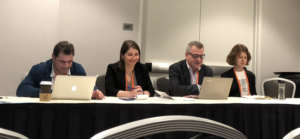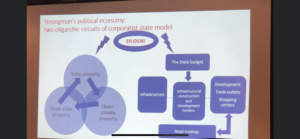Economy of Putin’s Russia: 15 Years of Deprivatization
 On November 23-26, 2019, the 51st annual convention of the Association for Slavic East European and Eurasian Studies (ASEEES) was held in San Francisco, California.
On November 23-26, 2019, the 51st annual convention of the Association for Slavic East European and Eurasian Studies (ASEEES) was held in San Francisco, California.
At the convention KRES Poliskola’s Executive Director Pavel Ivlev organized and chaired a round table discussion of economic processes in Russia over the past 15 years. He was joined by prominent experts: Kirill Rogov of Liberal Mission Foundation, Moscow, Maria Snegovaya of Johns Hopkins University, Washington D.C., and Olga Khvostunova of the Institute of Modern Russia, New York City.

Round table participants discussed the post-privatization economic policy of Putin’s regime, from its beginnings in early 2000s and up to the current days. While privatization of the vast industrial assets had been the dominating trend of Yeltsin’s government economic policy, since Putin took power the opposite approach has prevailed: state-owned national champions, such as oil major Rosneft or industrial behemoth Rostech have been acquiring assets that had been privatized in the 1990s. The start of deprivatization (or renationalization) processes in Putin’s Russia is often associated with the forced sale of Yuganskneftegaz, the biggest oil production subsidiary of privately owned Yukos Oil, to the state owned Rosneft, in December 2004.
Welcome to watch here the full video recording of the round table.




